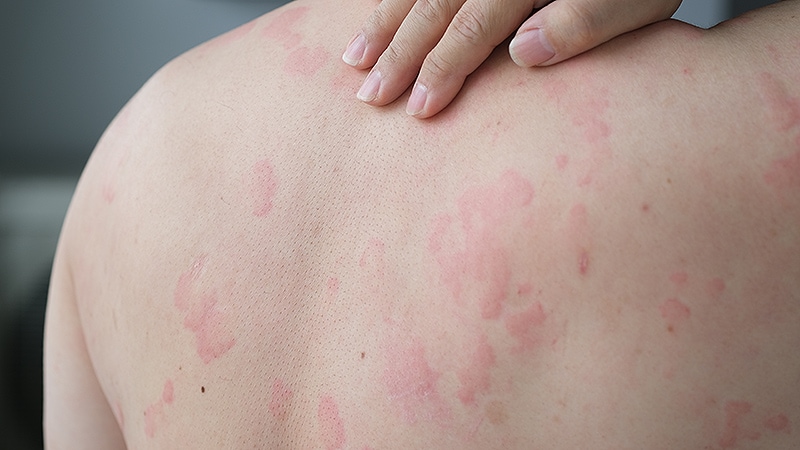In managing antihistamine-refractory chronic urticaria, omalizumab and remibrutinib stand out among the most effective treatments across multiple patient-important outcomes, followed by dupilumab, which shows improvement in urticaria activity, according to a meta-analysis of 42 systemic treatments in 93 studies.
All three treatments for chronic urticaria, a condition defined by wheal and itch symptoms persisting 6 weeks or more, have favorable safety profiles, according to the researchers, led by Alexandro W. L. Chu, MD, with the Department of Medicine and the Evidence in Allergy Group at McMaster University in Hamilton, Ontario, Canada.
Findings were published in The Journal of Allergy and Clinical Immunology as part of an update of chronic urticaria guidelines for the American Academy of Allergy, Asthma & Immunology (AAAAI), American College of Allergy, Asthma & Immunology (ACAAI), and Joint Task Force on Practice Parameters (JTFPP).
The meta-analysis examined patient-important outcomes beyond itch and wheal assessment such as angioedema, sleep quality, urticaria- and angioedema-related quality of life, and adverse events at the longest available time point. The researchers used measures including the 7-day Urticaria Activity Score, Chronic Urticaria Quality of Life Questionnaire and Angioedema Quality of Life Questionnaire.
Dupilumab improves itch and wheals, “but it is uncertain whether it improves angioedema or quality of life,” the researchers wrote. Cyclosporine, while it may be among the most effective, the analysis noted, may also be among the most harmful treatments with a high frequency of adverse events.
In the intermediate range of effectiveness is low-dose omalizumab (doses below the standard 300 mg or administration less frequent than every 4 weeks) and that low dose also has a favorable safety profile, the data showed.
“Azathioprine, dapsone, hydroxychloroquine, mycophenolate, sulfasalazine, and vitamin D may improve outcomes, while benralizumab, quilizumab, and tezepelumab may not differ from placebo, though the evidence is uncertain,” the report stated. “Findings were consistent across age groups and baseline severity and were robust to subgroup analyses.”
Patients’ comorbidities may also steer treatment selection, the authors wrote. “For instance, patients with concomitant food allergies may favor omalizumab, while those with chronic rhinosinusitis with nasal polyposis or atopic dermatitis may favor dupilumab.”
Remibrutinib
Rachel Meltzer, MD, MPH, director of the Pruritus Clinic at Brigham and Women’s Hospital and instructor in dermatology at Harvard Medical School, both in Boston, told Medscape Medical News the most important aspect of the meta-analysis is the side-by-side comparison of the treatments, particularly the comparison with the bruton tyrosine kinase inhibitor remibrutinib, which, she noted, is not yet approved by the FDA for any indication in dermatology.
“The only people who have any clinical experience with it are the people running the trials at the moment,” she said, and information from them indicates that “remibrutinib does sound promising. The exciting thing is that it’s an oral medicine and it seems to have a good safety and efficacy profile, whereas now, if someone fails our standard oral regimen, the move frequently has been to go to Zolair/omalizumab or less frequently in dermatology, cyclosporine.”
“Omalizumab has been approved for quite some time and that’s been kind of the go-to if you need to escalate therapy if people fail the first-line high-dose antihistamines,” she said.
Dupilumab, she said, “wouldn’t be the first thing I’d try unless someone had a comorbidity of atopic dermatitis or asthma or allergic rhinitis with nasal polyps,” she said. It was approved in April for chronic spontaneous urticaria.
This is the first review of chronic urticaria treatments that has “systematically analyzed the overall relative benefits and harms of all available options or appraised the evidence using robust and standardized approaches,” the authors wrote.
This study was commissioned by the AAAAI and the ACAAI through the JTFPP.
Several authors reported multiple ties to pharmaceutical companies, which are available with the full text. Meltzer reported no relevant financial relationships.
Marcia Frellick is an independent healthcare journalist and a regular Medscape contributor.
Source link : https://www.medscape.com/viewarticle/top-3-chronic-urticaria-treatments-highlighted-meta-analysis-2025a1000jkr?src=rss
Author :
Publish date : 2025-07-24 12:30:00
Copyright for syndicated content belongs to the linked Source.
